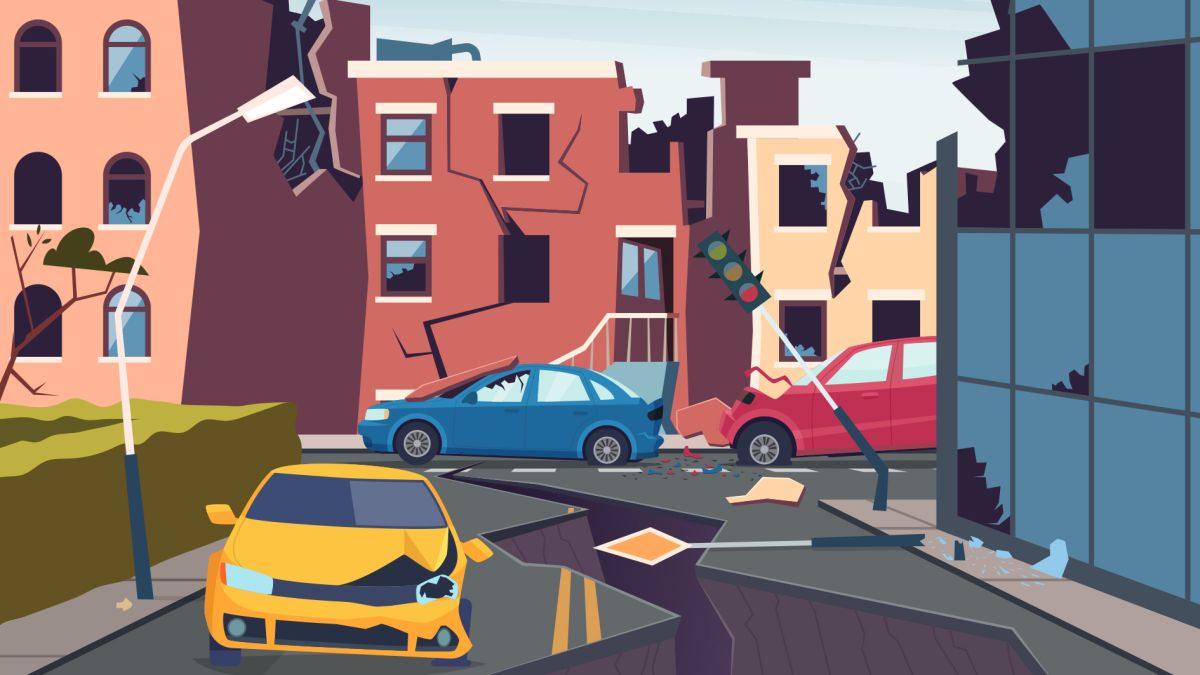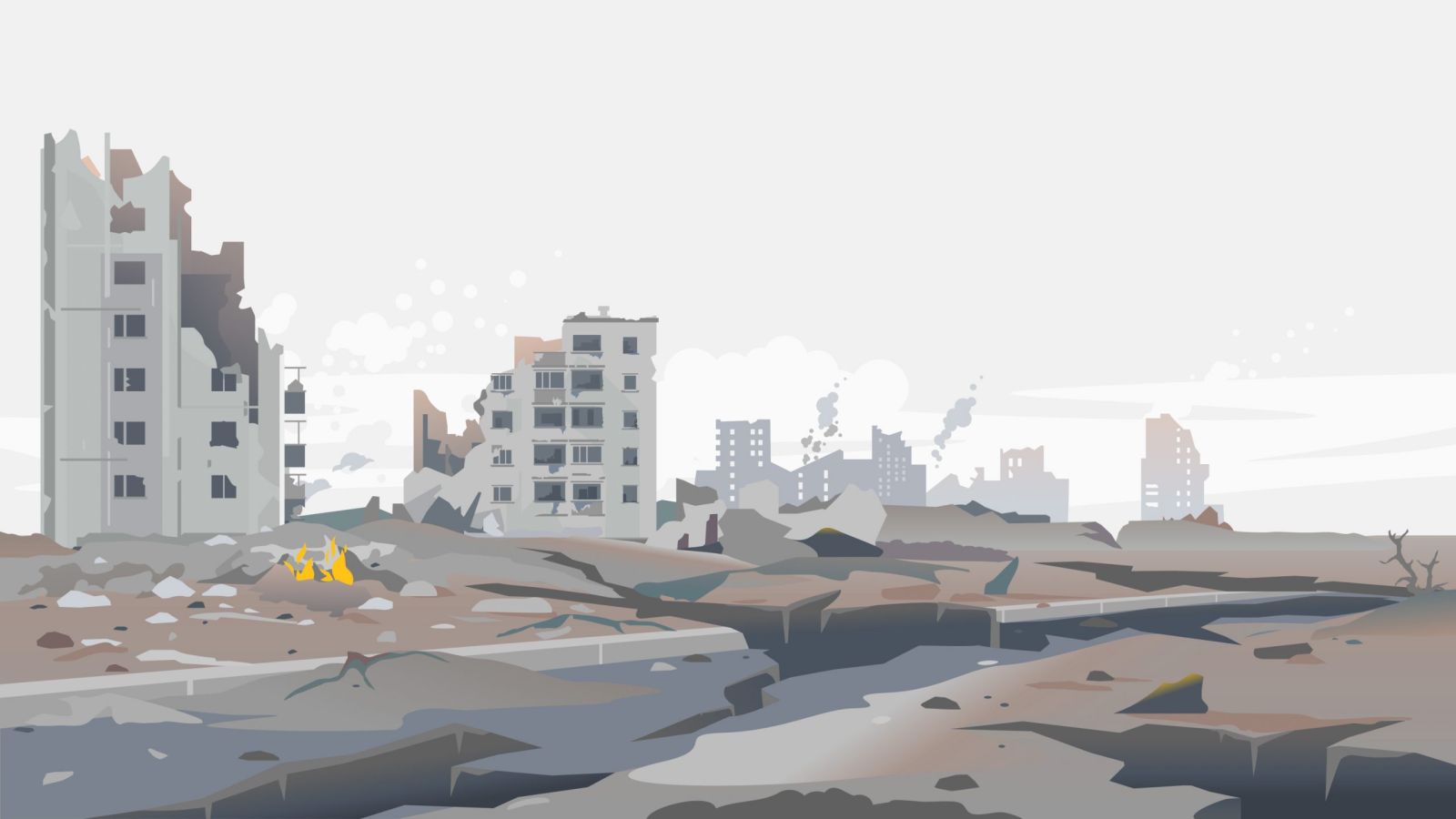Understanding Earthquakes and Other Disasters: An Islamic Perspective
Dr. Abū Wāʾil Musa Shaleem


Earthquakes and other disasters continue to strike, and over the years, many theories have been put forth attempting to explain how these disasters occur and how they can be minimised, yet most Muslims are unaware that most of these theories contradict the very fundamentals of Islām. Also, many Muslims are simply oblivious to their Islamic obligations when these calamities strike. Furthermore, while most people may only view the occurrence of such events as disastrous because their understanding of this topic is purely scientific, Islām clearly explains the wisdom behind this destruction. Therefore, this article primarily aims to give the Islamic perspective on this topic.
Not only did Allāh create the universe, but He also controls its affairs. He said:
يُقَلِّبُ اللَّهُ اللَّيْلَ وَالنَّهَارَ ۚ إِنَّ فِي ذَٰلِكَ لَعِبْرَةً لِّأُولِي الْأَبْصَارِ
“Allāh alternates the day and the night. Surely this is a lesson for insightful people.”
[Nūr, 24:44]
He also said:
وَاخْتِلَافِ اللَّيْلِ وَالنَّهَارِ وَمَا أَنزَلَ اللَّهُ مِنَ السَّمَاءِ مِن رِّزْقٍ فَأَحْيَا بِهِ الْأَرْضَ بَعْدَ مَوْتِهَا وَتَصْرِيفِ الرِّيَاحِ آيَاتٌ لِّقَوْمٍ يَعْقِلُونَ
“The alternation of the day and the night, the provisions that Allāh sends from the skies—which revive the earth after its death—and the shifting of the winds are signs for people of understanding.”
[Al-Jāthiyah, 45:5]
In fact, Allāh constantly arranges the universe’s affairs. He himself said:
كُلَّ يَوْمٍ هُوَ فِي شَأْنٍ
“He is constantly arranging the affairs.”
[Al-Raḥmān, 55:29]
Therefore, Allāh creates and controls earthquakes, floods, hurricanes, tornadoes, volcanoes, storms, and other disasters. He said:
مَا أَصَابَ مِن مُّصِيبَةٍ فِي الْأَرْضِ وَلَا فِي أَنفُسِكُمْ إِلَّا فِي كِتَابٍ مِّن قَبْلِ أَن نَّبْرَأَهَا ۚ إِنَّ ذَٰلِكَ عَلَى اللَّهِ يَسِيرٌ
“Every calamity that befalls you or occurs on the earth was written in a book before it occurred.”
[Al-Ḥadīd, 57:22]
He also said:
مَا أَصَابَ مِن مُّصِيبَةٍ إِلَّا بِإِذْنِ اللَّهِ ۗ
“A calamity can only occur if Allāh permits its occurrence.”
[Al-Taghābun, 64:11]
He also said:
وَفِي عَادٍ إِذْ أَرْسَلْنَا عَلَيْهِمُ الرِّيحَ الْعَقِيمَ ﴿٤١﴾ مَا تَذَرُ مِن شَيْءٍ أَتَتْ عَلَيْهِ إِلَّا جَعَلَتْهُ كَالرَّمِيمِ ﴿٤٢﴾ وَفِي ثَمُودَ إِذْ قِيلَ لَهُمْ تَمَتَّعُوا حَتَّىٰ حِينٍ ﴿٤٣﴾ فَعَتَوْا عَنْ أَمْرِ رَبِّهِمْ فَأَخَذَتْهُمُ الصَّاعِقَةُ وَهُمْ يَنظُرُونَ ﴿٤٤﴾ فَمَا اسْتَطَاعُوا مِن قِيَامٍ وَمَا كَانُوا مُنتَصِرِينَ ﴿٤٥﴾ وَقَوْمَ نُوحٍ مِّن قَبْلُ ۖ إِنَّهُمْ كَانُوا قَوْمًا فَاسِقِينَ ﴿٤٦﴾
ʿĀd’s story contains a lesson. We sent a violent wind to destroy his people. The wind reduced everything to shreds. Thamūd’s story contains another lesson. It was said to his people: “Enjoy yourselves for a short period.” They continued to defy their Lord’s command, so We seized them with a mighty blast when they were looking. They were not able to stand, nor were they given any assistance. Nūḥ’s people were also destroyed. They were truly sinful.
[Al-Dhāriyāt, 51:41-46]
Furthermore, Jābir ibn ʿAbdillāh (رضي الله عنه) narrated:
When [this part of] the verse:
قُلْ هُوَ الْقَادِرُ عَلَىٰ أَن يَبْعَثَ عَلَيْكُمْ عَذَابًا مِّن فَوْقِكُمْ
“Say: ‘He [i.e. Allāh] alone has the power to unleash a torment upon you from above’” [Al-Anʿām, 6:65] was revealed, Allāh’s Messenger (ﷺ) said: “I seek refuge with Your Face.”
When [the remainder of] the verse:
أَوْ مِن تَحْتِ أَرْجُلِكُمْ
“‘or from beneath you’” [Al-Anʿām, 6:65] was revealed, Allāh’s Messenger (ﷺ) [again] said: “I seek refuge with Your Face.”[1]
Imām Al-Baghawī (d. 516 AH) (رحمه الله) commented:
“‘Torment from above’” is like a blast, or stones, or wind, or excessive rain that causes widespread flooding, as Allāh unleashed upon the people of ʿĀd, Thamūd, Shuʿayb, Lūt, and Nūḥ.
“‘From beneath you’” is like an earthquake or a gaping hole that swallows up people, as Allāh unleashed upon the people of Shuʿayb and Qārūn”[2]
Therefore, Allāh creates and controls these disasters; therefore, whoever describes them as natural disasters has committed shirk, since this person not only claims nature creates and controls these catastrophes, but he also claims nature controls the universe. Therefore, this person is a mushrik since he ascribed a partner with Allāh in His Lordship.
“Whoever says that an earthquake is a natural disaster is a kāfir, since he ascribed [the cause of] the earthquake to nature, and nature itself is incapable of creating or altering [the creation]. This is the Islamic verdict of the person who says this.”[3]
Only atheists describe these catastrophes as natural disasters, as they deny Allāh’s existence, far less for believing that He controls the universe.
Shaykh Muqbil ibn Hādī al-Wādiʿī (رحمه الله) said: “Atheists, those who disbelieve in Allāh, ascribe these events to nature.”[4]
Seismologists, many of whom are atheists, say a sudden release of stress along faults in the earth’s crust causes earthquakes. The continuous motion of tectonic plates causes a steady increase in pressure and stress until they are released as a sudden jolt. The resulting waves of seismic energy propagate through the ground and over its surface causing the shaking we perceive as earthquakes.
While Islām may not necessarily reject this theory because it is based on observable data, Muslims say Allāh ultimately is the One who creates and controls earthquakes and other calamities, since He is the One who commands and controls the elements and factors—like pressure, temperature, and stress—to steadily increase between the tectonic plates until they cause an earthquake. This proves that scientific theories and Islamic legislation may not always necessarily contradict each other.
In recent times, the domains of social and political science have become dominated with climate crisis theories that posit the earth as an interdependent ecosystem, such that the planet and its creatures are solely reliant on each other for the continuation and prosperity of the earth. These climate hoax ideas are formulated from atheist darwinist theories that make their parishioners believe that the earth will capitulate soon without human intervention. They have even renamed the earth “Gaia” and created a new culture of Uluhiyyah (i.e. servitude) in which humans must be in service to the earth, a form of deity that provides for them. This emerging ‘clima-church’ is frightening people into the belief that what they refer to as “natural disasters” are caused solely by the actions of humans. To them, earthquakes, floods, storms, hurricanes, and even global warming are the result of human behaviour alone, and the only solution to these problems are authoritarian mandates, such as ubiquitous carbon footprint tracking and restrictions and of course more carbon and environmental taxes. While Muslims do not deny that humans can cause harm to the environment by Allāh’s permission, the belief of the clima-cult stems from kufr (i.e. disbelief) and exaggeration. Muslims, particularly those in universities and the field of education, must be aware of this, as these theories completely disregard Allāh’s Rubūbiyyah (i.e. His Lordship).
Mankind’s sins and transgressions may cause Allāh to unleash these catastrophes, as Allāh said:
وَمَا كُنَّا مُهْلِكِي الْقُرَىٰ إِلَّا وَأَهْلُهَا ظَالِمُونَ
“We would never destroy a society unless its people persistently transgressed.”
[Al-Qaṣaṣ, 28:59]
He also said:
وَضَرَبَ اللَّهُ مَثَلًا قَرْيَةً كَانَتْ آمِنَةً مُّطْمَئِنَّةً يَأْتِيهَا رِزْقُهَا رَغَدًا مِّن كُلِّ مَكَانٍ فَكَفَرَتْ بِأَنْعُمِ اللَّهِ فَأَذَاقَهَا اللَّهُ لِبَاسَ الْجُوعِ وَالْخَوْفِ بِمَا كَانُوا يَصْنَعُونَ
“Allāh drew the example of a society that was safe and secure. It received its provision abundantly from every place, but its people were ungrateful, so Allāh made them taste the clutches of hunger and fear for their misdeeds [i.e. their ungratefulness, etc.].”
[Al-Naḥl, 16:112]
He also said:
وَمَا أَصَابَكُم مِّن مُّصِيبَةٍ فَبِمَا كَسَبَتْ أَيْدِيكُمْ
“Whatever affliction befalls you resulted from your own doing.”
[Al-Shūrá, 42:30]
Consequently, Ṣafiyyah bint Abī Aubay (رضي الله عنها) relayed: “An earthquake occurred in the time of ʿUmar ibn al-Khaṭṭāb (رضي الله عنه), so he said: ‘O people, what is this?! How hasty are you to commit what you have committed [i.e. sins and transgressions]! If you continue this, I will leave this place.’”[5]
Therefore, if sinning causes Allāh to unleash these catastrophes, we can deduce that obeying His commands and avoiding His prohibitions will minimise them. However, Allāh himself explicitly mentions this. He said in one instance:
وَلَوْ أَنَّهُمْ أَقَامُوا التَّوْرَاةَ وَالْإِنجِيلَ وَمَا أُنزِلَ إِلَيْهِم مِّن رَّبِّهِمْ لَأَكَلُوا مِن فَوْقِهِمْ وَمِن تَحْتِ أَرْجُلِهِم
“Had they observed the Torah, the Gospel, and what was revealed to them from their Lord, they would have been overwhelmed with provisions from above and below.”
[Al-Māʿidah, 5:66]
In another instance, Allāh said:
وَلَوْ أَنَّ أَهْلَ الْقُرَىٰ آمَنُوا وَاتَّقَوْا لَفَتَحْنَا عَلَيْهِم بَرَكَاتٍ مِّنَ السَّمَاءِ وَالْأَرْضِ وَلَٰكِن كَذَّبُوا فَأَخَذْنَاهُم بِمَا كَانُوا يَكْسِبُونَ
“Had the people of those societies believed and been fearful, We would have overwhelmed them with blessings from heaven and earth, but they disbelieved, so We seized them for what they used to commit [i.e. sins].”
[Al-Aʿarāf, 7:96]
Mankind’s intellect is limited, so we may be incapable of comprehending any possible wisdom resulting from death and destruction; however, Allāh—Who is the Most Wise—may send these signs to scare humanity so that they may reflect upon their actions, remember their defiance of His commands and their indulgence in His prohibitions, repent from their sins, and remember Him more frequently. The Most Wise said about these catastrophes:
وَمَا نُرْسِلُ بِالْآيَاتِ إِلَّا تَخْوِيفًا
“We only send these signs to terrorise them.”
[Al-Isrāʾ, 17:59]
Qatādah (رضي الله عنه) commented: “Allāh terrorises the people with whatever he desires so they may reflect [upon their actions], or remember [their defiance], or repent [from their sins].”[6]
Also, the Messenger (ﷺ) said: “Verily, the sun and the moon are two signs among Allāh’s signs. He utilises them to frighten his servants. Death does not cause the sun and the moon to eclipse.”[7]
This destruction may also be a test. Allāh said:
أَمْ حَسِبْتُمْ أَن تَدْخُلُوا الْجَنَّةَ وَلَمَّا يَأْتِكُم مَّثَلُ الَّذِينَ خَلَوْا مِن قَبْلِكُم ۖ مَّسَّتْهُمُ الْبَأْسَاءُ وَالضَّرَّاءُ وَزُلْزِلُوا حَتَّىٰ يَقُولَ الرَّسُولُ وَالَّذِينَ آمَنُوا مَعَهُ مَتَىٰ نَصْرُ اللَّهِ
Do you think you will be admitted into Paradise without being tested like those before you? They were afflicted with suffering and adversity and [their hearts] were violently shaken such that even the Messenger and the believers cried out: “When will Allāh’s help arrive?”
[Al-Baqarah, 2:214]
Shaykh Muqbil ibn Hādī al-Wādiʿī (رحمه الله) concluded: “These signs may be a test, or they may be terrorising events.”[8]
Regardless, a Muslim must never conjure up bad thoughts about his Lord, which is a characteristic of the hypocrites and the polytheists. Allāh said:
وَيُعَذِّبَ الْمُنَافِقِينَ وَالْمُنَافِقَاتِ وَالْمُشْرِكِينَ وَالْمُشْرِكَاتِ الظَّانِّينَ بِاللَّهِ ظَنَّ السَّوْءِ ۚ عَلَيْهِمْ دَائِرَةُ السَّوْءِ ۖ وَغَضِبَ اللَّهُ عَلَيْهِمْ وَلَعَنَهُمْ وَأَعَدَّ لَهُمْ جَهَنَّمَ ۖ وَسَاءَتْ مَصِيرًا
“He may punish the hypocrites and the polytheists who harbour evil thoughts of Allāh. May ill-fate befall them! Allāh is displeased with them. He has condemned them and prepared Hell for them. What an evil destination.”
[Al-Fatḥ, 6:48]
Whenever such catastrophes occur, a Muslim must quickly engage in repentance, in Allāh’s remembrance, and in supplication.
The Prophet (ﷺ) said: “Death does not cause these signs that Allāh sends. Allāh utilises them to frighten his servants, so if you see one of these signs, hasten to supplicate, to make adhkār, and to repent.”[9]
Shaykh Ibn Bāz (رحمه الله)—giving advice on this topic—mentioned: “Every Muslim must repent, make abundant dhikr and istighfār, supplicate, and ask Allāh for safety and wellbeing.”[10]
If a Muslim resides in a non-Muslim country, he should try to make hijrah; otherwise, the disbelievers, the polytheists, and other sinners will constantly surround him. Consequently, ʿUmar ibn al-Khaṭṭāb (رضي الله عنه)—addressing the Muslims during his reign as the Muslim ruler—said: “If you continue this [i.e. singing and transgressing], I will leave this place.’”
Fleeing from sinners is an established practice, for the monk advised the man who killed one hundred people to forsake his land for this very reason. The monk said: “You should go to such and such land. There are devoted worshipers there, so you can accompany them in worship. Do not return to your land since it is evil [i.e. populated with sinners and transgressors].”[11]
Some scholars say prayer is also legislated. The Ḥadīth of Ibn ʿAbbās (رضي الله عنه) supports this. ʿIkrimah (رحمه الله) narrated:
Ibn ʿAbbās (رضي الله عنه) was informed that so and so, a certain wife of the Prophet (ﷺ), died. He fell prostrating. He was questioned: “Why do you prostrate at this time?” He said: “Allāh’s Messenger (ﷺ) said: ‘When you see a sign [i.e. a disaster], prostrate.’ And which sign [i.e. disaster] is greater than the death of one of the Prophet’s (ﷺ) wives.”[12][13]
Furthermore, showing compassion and empathy is recommended since the Prophet (ﷺ) said: “Al-Raḥmān shows mercy to the merciful. If you show mercy to the earth’s inhabitants, He who is in the heaven will show you mercy.”[14] As a result, ʿUmar ibn ʿAbd al-ʿAzīz (رحمه الله) would command the governors to give charity after an earthquake. Therefore, giving charity is legislated.
Additionally, aiding any Muslim victims is advised, as they may require assistance. The Prophet (ﷺ) said: “If a Muslim fulfilled his brother’s needs, Allāh will fulfil that Muslim’s needs.”[15]
Earthquakes will progressively occur much more frequently, for the Messenger (ﷺ) said: “The Hour will not be established until: knowledge will be taken away, earthquakes will occur very frequently, time will pass quickly, afflictions will appear, murders will increase, and money will overflow from amongst you.”[16] This prophecy validates the Messenger’s (ﷺ) prophethood, since statistical data shows that the frequency of earthquakes has increased significantly.
Finally, although statistical data also shows that the magnitude of recent earthquakes has intensified, the shaking of the earth when the Hour will be established is incomparable. Ponder the Most High’s statement:
إِذَا رُجَّتِ الْأَرْضُ رَجًّا ﴿٤﴾ وَبُسَّتِ الْجِبَالُ بَسًّا ﴿٥﴾ فَكَانَتْ هَبَاءً مُّنبَثًّا
“When the earth is violently shaken, and the mountains crumble and turn to dust.”
[Al-Wāqiʿah, 56:4-6]
He also said:
إِذَا زُلْزِلَتِ الْأَرْضُ زِلْزَالَهَا ﴿١﴾ وَأَخْرَجَتِ الْأَرْضُ أَثْقَالَهَا
“When the earth is shaken with its [final] quake, and the earth discharges the deceased.”
[Al-Zalzalah, 99:1-2]
He also said:
يَا أَيُّهَا النَّاسُ اتَّقُوا رَبَّكُمْ ۚ إِنَّ زَلْزَلَةَ السَّاعَةِ شَيْءٌ عَظِيمٌ ﴿١﴾ يَوْمَ تَرَوْنَهَا تَذْهَلُ كُلُّ مُرْضِعَةٍ عَمَّا أَرْضَعَتْ وَتَضَعُ كُلُّ ذَاتِ حَمْلٍ حَمْلَهَا وَتَرَى النَّاسَ سُكَارَىٰ وَمَا هُم بِسُكَارَىٰ
“O humanity! Fear your Lord, for the violent quaking at the Hour is surely a dreadful thing. On that Day, every mother will abandon her nursing child, and every pregnant woman will deliver her baby [prematurely], and people will appear to be drunk, but they will not be drunk.”
[Al-Ḥajj, 22:1-2]
Therefore, not only will the rumbling earth cause the mountains Allāh planted so firmly into the ground to crumble and turn to dust, but it will also cause the earth to discharge the deceased. It will cause a terror and a fear that will cause a mother—who would always protect her children—to abandon her offspring at the most vulnerable stage of his life. It will even induce labour prematurely. Furthermore, it will cause the people to appear to be drunk, but they will not be drunk. Their condition will be like this on that day. Consequently, Allāh described this final shake as “a dreadful thing.” [Al-Ḥajj, 22:1]
Therefore, as a reprimand, those who were given authority over others—like a ruler, or a father, or a husband—must not allow this authority to overpower those who have less authority and power, for Allāh’s Strength and Power is incomparable. He said:
إِنَّ اللَّهَ هُوَ الرَّزَّاقُ ذُو الْقُوَّةِ الْمَتِينُ
“Certainly, Allāh is the Provider, Owner of Strength, the Powerful.”
[Al-Dhāriyāt, 51:58]
May Allāh make us obedient servants, and may He protect us from any future atrocities. If, however, He decreed that an atrocity would strike us, may He provide quick relief and aid. If any lives were lost, may He have mercy upon the deceased Muslims, and may He grant them martyrdom.[17]
Endnotes:
[1] Reported by al-Bukhārī ((4628) and (7313) and (7406)).
[2] Tafsīr al-Baghawī, vol. 3, pg. 153.
[3] الحكم فيمن يقول إن الزلازل والفيضانات كوارث طبيعية
[4] الحكم فيمن يقول إن الزلازل والفيضانات كوارث طبيعية
[5] Musnad al-Fārūq (188).
[6] Tafsīr Ibn Kathīr, vol. 5, pg. 91.
[7] Reported by Muslim ((911) and (901)).
[8] الحكم فيمن يقول إن الزلازل والفيضانات كوارث طبيعية
[9] Reported by al-Bukhārī (1059) and Muslim (912).
[10] نصيحة حول الزلازل
[11] Reported by Muslim with this wording (2766).
[12] Reported by Abū Dāwūd (1197), and Shaykh al-Albānī deemed it authentic.
[13] The eclipse prayer comprises two units. In every unit, the worshipper must make rukūʿ and sajdah twice. This prayer can be prayed singly or congregationally.
As for earthquakes and any other signs, then Ibn ʿAbbās (رضي الله عنه) was reported to have performed three units with four prostrations. Imām Aḥmad (رحمه الله) said this prayer should comprise four units and four prostrations. This prayer, like the eclipse prayer, can also be prayed singly or congregationally.
[14] Reported by Abū Dāwūd (4941) and al-Tirmidhī (1924), and Shaykh al-Albānī graded it authentic.
[15] Reported by al-Bukhārī (6951) and Muslim (2580).
[16] Reported by al-Bukhārī (1036).
[17] The Messenger (ﷺ) said: “The martyrs are five. Whoever drowns, or dies from plague, or from a stomach illness, or from fallen debris, or from fighting in Allāh’s path is a martyr.” (Reported by al-Bukhārī ((653) and (2829)) and Muslim (1914)).
Most Popular: Last 30 Days

















